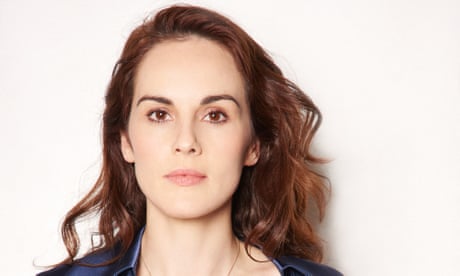Godless review – Netflix's wonderfully wicked western fires on all cylinders
The seven-part miniseries, starring Jeff Daniels and Michelle Dockery, is visually spellbinding and filled with standout performances
Jake Nevins
@jhnevinsThu 23 Nov 2017
Godless, Netflix’s new seven-part miniseries, opens in 1884, in Creede, Colorado, with a thick cloud of smog shrouding the camera. The haze slowly dissolves to reveal a chilling landscape: parched bodies being tended to by swarms of flies; a man, sedentary, with a gunshot through his head; a train-wreck near which a young boy hangs from a noose; and a woman, crouched over a corpse, singing mournfully about Christ. It’s a near-wordless several minutes, a triumph of mood and cinematography, that evokes the sort of rough-and-tumble anarchy of the great filmic frontiersman. Soon after, we’re in La Belle, New Mexico, where we learn who’s responsible for the massacre, and from thereon it’s guns blazing.

Michelle Dockery: 'I consider myself a widow'
Read more
Written and directed by Scott Frank and executive-produced by Steven Soderbergh, Godless is grim, exciting and visually arresting. It’s slow, but necessarily so, patiently offering vital exposition while its classic, western plot unfurls itself violently. That violence can be pegged, mostly, to Jeff Daniels’ Frank Griffin, a menacing, one-armed outlaw who’s looking for a man named Roy Goode. Goode, played by Jack O’Connell, was once a member of Griffin’s criminal cabal, but when a train heist turns savage and Goode saves a woman who’s being raped, he bucks town with the loot, staves off Griffin and his 32 men, and lumbers to a farm owned by Alice Fletcher (Michelle Dockery).
Fletcher, who Dockery plays with brutal, soft-spoken gravitas, is twice-widowed and lives with her son, Truckee. After a catastrophic mining accident wiped out most of the townsmen, La Belle has become a colony of tough, strong-willed women, the sort of place one imagines Julie Christie’s Mrs Miller might have resided had McCabe not been in the picture. A bit of internet digging reveals that La Belle was actually a real town, in Taos County, New Mexico, named after Belle Dixon, the wife of a gold miner; though it lasted just 16 years, it makes a weird kind of sense that it’s been revitalized in 2017 as a proto-feminist pasture, shot in a sweeping 2.39:1 aspect ratio where horses roam and women rule. And the show sets itself up for those women to stand their ground against Griffin’s outlaws.
Godless was originally intended to be a movie, but Soderbergh encouraged Frank, who co-wrote the screenplays for the films Logan, Marley & Me, and Minority Report, to turn it into a miniseries. After watching the hour-plus-long first episode, which only plants the seeds of what’s to come, and the equally lengthy ones that follow, it’s no wonder Soderbergh thought the script a better fit for television. Characters are developed richly but steadily, and much needs to be established before Griffin and Goode’s inevitable confrontation, the lead-up to which is beautifully protracted to give weight and import to several other characters, among them Merritt Wever’s Mary Agnes, another of La Belle’s gritty, gun-toting widows, and her brother Sheriff Bill McNue (Scoot McNairy), who is hot on Griffin’s heels and delivers wonderfully hokey one-liners like, “You don’t seem all that much like a desperado so much as you just look desperate.”
It’s hard to pinpoint one standout performance; Dockery is superb, wielding her gun with mighty force, and so is Wever, who’s been a stalwart supporting player on shows like The Walking Dead and Nurse Jackie; Daniels is a convincingly boozy villain, whiskey dribbling down his beard as he looks to exact revenge on his old protege; and McNairy, O’Connor and Thomas Brodie-Sangster, as the town deputy Whitey Winn, each turn in authentic, understated performances. It would not be surprising to see one or two or even three of them in the Emmys conversation next summer, which tends to emphasize plucky, period-piece roles like these.
The plot may be too slow for some – which, in addition to the genre, might drive viewers away – but Godless is worth it if only for aesthetic pleasure. Shot by Steven Meizler, who worked with Soderbergh on The Girlfriend Experience, the long, vivid tracking shots are lyrical and impressionistic, and there’s a scene in a church, where Griffin implores the townspeople to steer clear of Roy Goode lest they suffer like Christ did, that brought to mind the great face-off between Daniel Plainview and Eli Sunday of There Will Be Blood. That the series is so full of cinematic references both visual and narrative is part of the fun; Godless doesn’t resist its classification as a western with a capital W, and instead embraces the genre’s outsize influence in the American film canon.Godless is now available on Netflix worldwide
No comments:
Post a Comment